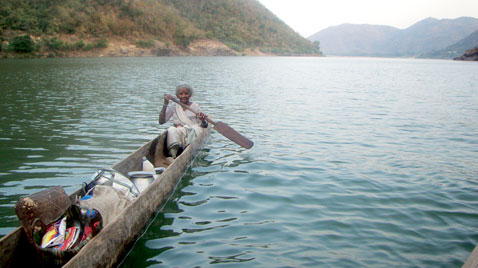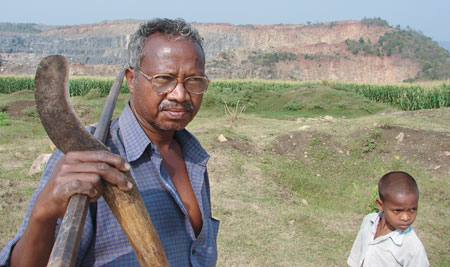Most of the people threatened to be displaced cannot be relocated until their rights over forestland are recognized under the Forest Rights Act. How did the Andhra Pradesh government meet this immense challenge? It quietly told the Union environment and forests ministry that all claims have been settled.
The ministry gave forest clearance to the project last year. Now over 50 villages have written to the ministry, saying their forest rights have not been settled. Richard Mahapatra visited the villages and found the state had indeed lied.
Following similar complaints, the ministry had scrapped Vedanta’s proposal to mine Niyamgiri hills and withheld forest clearance to the POSCO steel plant in Odisha. Will it apply the same yardstick to Polavaram?
 Residents of Teladibbalu did not know they had forest rights. The village is in the dam’s submergence zone and accessible only by boat. (Photo: G Srinivas).
Residents of Teladibbalu did not know they had forest rights. The village is in the dam’s submergence zone and accessible only by boat. (Photo: G Srinivas).
Fear of submergence haunts Kurturu, a village nestled in the Papi hills of the Eastern Ghats in Andhra Pradesh. In 2005, a band of officials, an unusual sight in this remote village in West Godavari district, visited the place and marked a rock. Then they broke the news about the Polavaram multi-purpose project on the river Godavari that would submerge Kurturu along with 275 other villages.
The words “FRL 150 feet” are inscribed on the rock face, which mean submergence at full reservoir level of 150 feet (45.72 metres); it indicates the level to which the river will rise once the Polavaram dam is constructed. The rock is at a much higher level than the 1986 flood level. Kurturu residents have vivid memories of the flood—the worst by far, when the Godavari rose by over 45 metres and submerged the village. The residents, belonging to the Konda Reddy tribe, point at trees on the hill to indicate the flood level. The flood lasted just two days. The dam will submerge the village forever. Even in summer, when the river’s flow is relatively low, the village will be submerged 18 metres under water, informs Rajakrishna Reddy, a resident of Kurturu.
“If one knows only how to fish and gather forest produce for a living, there is no other place where one can survive,” says Reddy as others nod in agreement. As compensation, the state government has offered the residents land 15 km away, in the plains.
‘Gigantic in size and violations’
The Polavaram dam, an earth and rock-filled structure, will displace the largest number of people in India’s history of such projects. “For every five acres (2.02 hectares) that will be irrigated by the project, one tribal family will be displaced,” says E A S Sarma, former power secretary, who has been tracking the project (see map, and ‘400,000 may be displaced’, right). The dam’s backwaters will submerge 3,731 hectares (ha) of forestland; its net present value, assessed at Rs 13 lakh per 0.4 ha, would add up to Rs 1,120 crore.
 Muchika Challabi of Chengudapalli village in Polavaram says his claim to forest title was rejected for no reason.
Muchika Challabi of Chengudapalli village in Polavaram says his claim to forest title was rejected for no reason.
(Photographs: Richard Mahapatra).
The Union Ministry for Environment and Forests (MoEF) gave site clearance for the Polavaram dam in October 2005. But the National Environment Appellate Authority quashed the environmental clearance to the dam because the mandatory public hearings were not held. The state appealed to the high court and obtained a stay. The petitioner in the case, Sreedhar Ramamurthy of non-profit Environics Trust, has now appealed to the Supreme Court to stop the project. The project’s cost has, meanwhile, escalated to Rs 20,000 crore; the state has not been able to raise funds for it till date (see ‘Who will fund Polavaram dam’,).
“The project is not only gigantic in size but also in degree of violation of rules and regulations,” says Ramamurthy. Work on the main dam is yet to begin. But work on two canals has started; about Rs 250 crore has been spent on them. The left canal almost touches the outskirts of Visakhapatnam.
The project, by default, marks the inauguration of the controversial National River Linking Project which proposes inter-basin transfer of water from surplus river basins to deficit ones. The Polavaram project includes a link between the Krishna and the Godavari rivers, which will be the first of the 37 links proposed under the river linking project.
Kurturu’s residents have been waging a desperate battle to stay afloat. In 2008, they came to know about the Scheduled Tribes and Other Traditional Forest Dwellers (Recognition of Forest Rights) Act, 2006, popularly called Forest Rights Act (FRA). Section 4(5) of the Act states no forest dweller can be removed from his land until the process of recognition of rights is completed. Even after the procedure is completed, the rights, which include rights to traditional habitats and community forest resources, have to be respected, FRA says.
The information renewed hope. The residents felt the Act’s provisions could be used to stop the project because their rights to the forests near the village had not been settled. Besides, the village is in schedule five area which has special protection; the gram sabhas in such areas have the right to withhold consent to a project. The residents were almost certain the Polavaram dam would be scrapped. But their hopes were dashed when MoEF gave forest clearance to the project in July 2010.
The ministry’s stand was, however, quite different when it dealt with two projects in Odisha. It scrapped the environmental clearance given to Vedanta’s mining proposal in August 2010 because of violation of FRA provisions. On April 13 this year, MoEF withheld forest clearance to the POSCO steel plant in Jagatsinghpur district. Violation of FRA was a major reason for the rethink on India’s biggest direct foreign investment project, promoted by South Korean steel giant, POSCO.